24 April 2020: Home Learning
You made it to the end of the week- well done.
Yesterday, I enjoyed doing some science outside with George and Harry in the sun. We tested hand wash, shampoo and washing up liquid to see which one made the tallest ‘bubble tower’! They decided washing up liquid was the most effective.
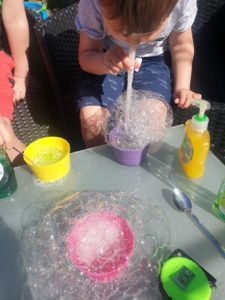
Answers to yesterday’s maths.
Today’s learning……….
Maths: fractions
Can you found examples of ‘real-life’ fractions in your home? Here are some ideas to help you. Take some pictures and email any you find. nataliebeatson@spherefederation.org
Writing: a challenge from Mr Roundtree……..
23 April 2020: Home Learning
Happy Thursday! This week seems to be going very quickly for me- how is it going for you? I hope you’re getting back into a routine and staying happy and healthy.
Here are the answers to yesterday’s maths.
Today’s learning…….
Maths: multiplying fractions
Y6: To multiply fractions, you need to multiply the numerators together and multiply the denominators together. Watch the BBC video to remind you of how we do this.
Football fractions challenge- test yourself with Gary Lineker!
Writing: modal verbs
Yesterday, I signposted you to an online lesson on BBC Bitesize all about verbs and modal verbs. Today, complete this activity to see how much you can remember about modal verbs.
Geography: The Lake District
On Tuesday, I asked you to find mountain regions in the UK. Today, I would like you to focus on one region: The Lake District. Do you know where in the UK it is? Follow the BBC Bitesize lesson to find out more about this area and find out some facts!
22 April 2020: Home Learning
I hope you’ve enjoyed the sunshine alongside doing some learning. This week, one task each day will involve going onto the BBC Bitesize website to complete a lesson. If you have any problems then please let me know.
The answers to yesterday’s maths.
Today’s learning……..
Maths: multiplying fractions
Year 5 unit fraction x whole number
Year 6 mixed number x whole number
Reading: comprehension
Read the text about video games and answer the questions. The answers are at the bottom of the questions- don’t look until you’ve finished!
Writing: passive and active verbs
We have looked at identifying and using active and passive verbs last term. Complete this lesson by reading some tips, watching a video and completing an activity.
21 April 2020: Home Learning
I hope your first day back at ‘home school’ went OK.
Here are the answers to the maths fluency questions for Monday’s learning.
Year 5
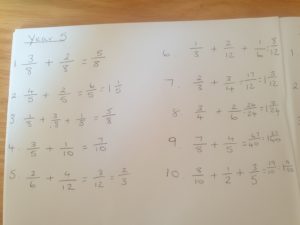
Year 6
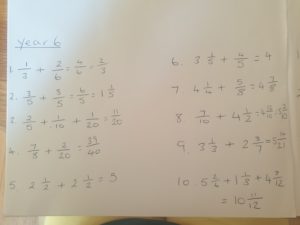
Maths learning: subtracting fractions
Remember, you need to make the fractions have the same denominator by finding a common multiple.
Writing: verbs and modal verbs
The BBC Bitesize website has some daily lessons for you to follow in various subjects and topics. Today, I would like you to revise all your knowledge of verbs and modal verbs by following this online lesson.
Geography: rivers and mountain ranges
How did you get on with naming the rivers of the UK yesterday?
Test your river knowledge today with this online quiz. How many can you get correct?
Can you use an atlas or an online map to locate the mountain ranges in the UK? Use this map to label each one.
Why don’t you make your own quiz and test your family on their river and mountain knowledge!
20th April 2020: Home Learning
Hello- I hope you’re all well. I’m really missing seeing you all and learning with you. Easter holidays have been very different but I hope you all managed to have some fun and enjoyed lots of chocolate! I have been running nearly every day (even though my half marathon has been cancelled) and I’ve been into Scholes Primary School to help look after some of the children who still need to go into school.
Home learning is starting again this week-each day at 9am. If you have any questions or would like to send me any pictures of your learning then email me at nataliebeatson@spherefederation.org
Today’s learning….
Today’s maths: adding fractions.
Remember that to add fractions you have to make the denominator the same. Think common multiples!
Year 5 learning
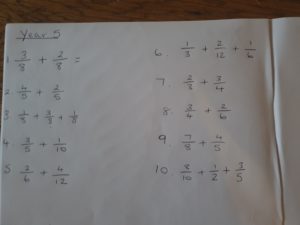
Writing: homophones
Choose the correct homophone to put in each sentence.
draught/ draft
I am going to ______ a letter of apology.
Since Billy didn’t shut the door properly, his mum could feel a small ______.
wary/ weary
Finally, he looked down at his lap and let out a long ____ sigh.
The sailors watched the horizon anxiously, _____ of the approaching storm.
Can you speed write these words? How many times can you write each word in 1 minute?
Silly sentences
Write your own silly sentence for each of the homophones above.
Topic
This half term we would normally be starting a geography topic.
This week, we will recap on some of the knowledge we learnt in the last geography topic.
Today, can you name the rivers in the UK?
Complete this sheet and see if you can locate the rivers in the UK.
Easter Home Learning
As it’s the Easter holidays, we’re taking a break from the daily home learning tasks. Instead, here are a range of activities that you might like to try over the two weeks. The tasks are creative and are designed to allow children the opportunity to enjoy some different learning, perhaps alongside family members. A few key points…
- The list will be the same across year groups, meaning if you’ve more than one child, they might work on it together in some way.
- Some of the tasks can take a bit longer, like a mini-project, and others match Creative homework tasks.
- You can encourage your child to do some or all of the activities – they’re all optional.
- During this time, you can still email your child’s class teacher about the home learning, although they may not respond as quickly as they have been doing.
- Teachers will return to daily home learning tasks on Monday 20 April.
Art Attack
Andy Goldsworthy is a British artist who creates art using things he can find in nature. The artwork shown here was created using different leaf types and creating a pattern. He creates his art outside as he likes the fact that it’s temporary and won’t be around for long!
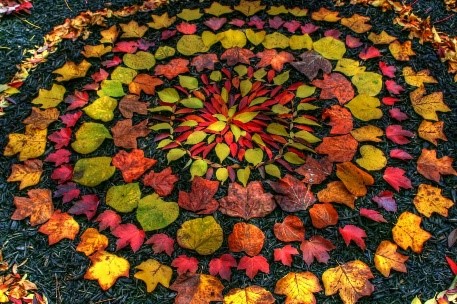
Create your own piece of art using different materials you can find around your home or in the garden. You could even create some ‘rubbish art’ using only items that have been used and would be thrown away or recycled.
Take some photographs and send them to your teachers.
Hunted
Create your own treasure hunt with cryptic clues for your family members to complete. Make the clues as tricky as you can. What could be the prize for the winning hunter? Maybe, this could tie in with a family Easter egg hunt.
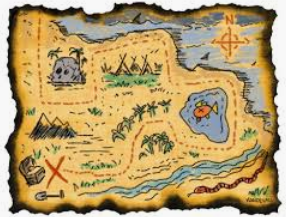
Secret Message
Create your own invisible ink.

Using a spoon, mix water and lemon juice. Dip a cotton bud into the mixture and write a message onto the white paper. Wait for the juice to dry so your message becomes completely invisible. When you are ready to read your secret message or show it to someone else, heat the paper by holding it close to a light bulb – be careful: maybe ask an adult to do this part. As the mixture heats up, your message should reappear so people can read it again.
Alternatively, the same result can be achieved by writing the message on white paper with a white candle or crayon. Then, paint over the message using coloured paint to reveal the writing.
For a challenge, come up with your own way of making invisible ink and try it out on your family.
‘Board’ Silly
Design and create your own board game for you and your family to play – perhaps play some existing board games first to research ideas.
There are a few key things to think about:
- What will your theme be?
- Will there be any ‘snakes’ or ‘ladders’ style elements?
- Do you need to make a dice using a cube net?
- Will there be any extra challenges or forfeits if you land on certain numbers?
Enjoy your games!

Extreme Reading
Reading is a great way to relax and learn about the world around us; also, reading regularly can help us to stay happy and healthy. This challenge is all about making reading even more fun. We’d love to know how many places you can read in. Try to read in a different place each day. Take photos or draw a picture of you doing it, if you can.
You could read…
- in a den that you’ve made
- up a tree
- under the bed/table
- to the dog/cat
- looking in a mirror
Stay safe and send your class teacher some pictures.
Come Dine/Bake with Me
Have your very own family ‘Come Dine With Me’ experience. Each family member could cook a meal or a course and then you must score each other out of ten. Similarly, each family member could bake something and you could all have a tasting after where you give points (like on Great British Bake Off). You don’t have to work on your own – you could help an adult.
Who will win?

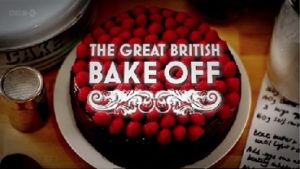
Den Building
Who doesn’t love making a den? Either in your house, or in your garden, spend time building a den and enjoy some time relaxing in it – if there’s more than one of you, you could make it a competition. Use whatever materials you can find and see how creative you can get.
You could also read in it and combine this challenge with the ‘Extreme Reading’ one.
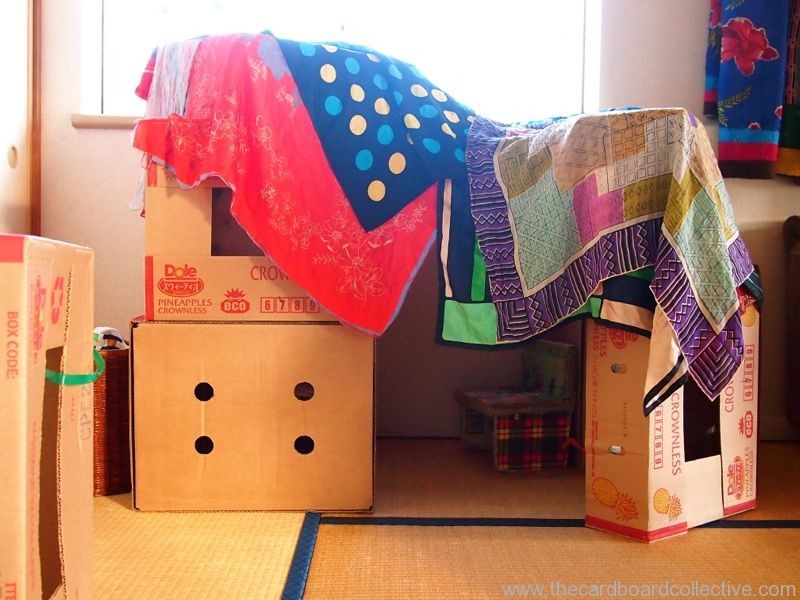
Get Ya Body Movin’
Staying physically active plays a crucial role in keeping us happy and healthy; it boosts our mental and emotional health, too. This task has three options – all of which are designed to get people moving during the holidays. You could include your family as well.
Option A: Create your own ‘Ninja Warrior’ style challenges in the garden or your house. Try to include a range of activities that include jumping, balancing, stretching, climbing and, if you’re feeling brave, water. The adults in your family will love a water challenge.
Option B: Create your own Joe Wicks style workout video. You could do it with your family or film yourself and send it to your friends. You might like to check out Joe Wicks’ YouTube channel for inspiration.
Option C: Choose your favourite song and create your own ‘Wake Up Shake Up’ (WUSU) dance routine. Again, you could lead this for your family to join in or film yourself and send it to friends or other family members. This’ll be a great way to get everyone dancing.
03 April 2020
You’ve made it to the end of the second week and it’s been lovely to hear from some of you throughout the week. Over the next two weeks, you will be able to choose from a selection of activities rather than completing different tasks set each day. This is because it is the Easter holidays, although it will probably feel slightly different to your normal Easter break. If you would like to send me any pictures of your learning or anything fun you’ve been getting up to, then it would be great to hear from you. Here is a reminder of my email address: nataliebeatson@spherefederation.org .
Have a look on the Newsround website to find out ‘how to BOSS being stuck at home’.
Answers to yesterday’s learning:
Maths task
Today’s learning is multiplication problems. The answers are at the bottom of the sheet so you can mark your answers.
Writing task:
Grammar revision all about pronouns. The answers are at the end of the document.
Reading task:
Today, there are no set comprehension questions; I would simply like you to enjoy reading. However, if you like, you could complete one (or more) of the following tasks…
- Read the paper with someone in your house and discuss the articles you’ve read.
- Do the same as above but with a friend from school over the phone.
- Respond creatively to one of the articles you’ve read (a bit like a creative homework).
- Interview someone in your house, or someone over the phone, and write your own news article about what you find out.
02 April 2020
Good morning everyone- I hope you’re all OK. Did anyone manage to write their own poem for the Leeds United challenge? If so, please can you try and email it to me so I can have a read.
Answers to yesterday’s maths learning:
Challenge:
Rosie has £300 in her bank account. Tommy has 100 times more than Rosie in his bank account.
How much more money does Tommy have than Rosie?
Tommy has £30,000. Tommy has £29,700 more than Rosie.
Maths task:
Today’s learning is multiplication.
Writing task:
Use this picture as a stimulus to write your own short story (under 200 words).
Reading task:
Read the poem by William Blake.
Complete the questions. Decide which level you want to have a go at: 1 star (easiest)to 3 star (hardest). The answers are available, so you can mark your own work afterwards.
Can you write some of your own questions for the poem?
01 April 2020
Happy Wednesday! I hope you’re all managing to stay as active as possible. Maybe you’ve been doing PE lessons with Joe Wicks or going for a walk. I’ve been enjoying Oti Mabuse’s dance classes on Youtube – it has really helped to motivate me and put me in a good mood!
Answers to yesterday’s learning tasks:
Investigate
Are all multiples of 8 multiples of 4? Yes
Are all multiples of 4 multiples of 8? No
Challenge:
Annie is double her sister’s age.
They are both older than 20 but younger than 50.
Their ages are both multiples of 7.
What are their ages? Annie is 42 and her sister is 21
Answers to the history task:
- Bowl used for cooking or holding food.
- Bone/antler comb for personal grooming.
- Gaming piece- possible made from whalebone. It would have been used in a board game as a counter.
- Silver bracelets- the rings were mainly used as jewellery but some were used as a form of payment.
Today’s learning is multiplying and dividing by 10, 100 and 1000.
Remember, if we’re multiplying by 10, 100 or 1000 the digits move to the left. If we’re dividing by 10, 100 or 1000 the digits move to the right.
Complete the fluency questions.
Challenge:
Rosie has £300 in her bank account. Tommy has 100 times more than Rosie in his bank account.
How much more money does Tommy have than Rosie?
Writing task:
Leeds United Primary Stars are setting youngsters a poetry challenge all about ambition. The website has all the information you need to have a go at writing your own poem. You can enter your poem and send it to plprimarystars@premierleague.com or share on Twitter @PLCommunities with the hashtag #PLPrimaryStars.
Art task:
I’ve found some tutorials on You tube that show you different mindfulness doodles/drawings you can have a go at. When I had a go, it made me feel calm and relaxed. Here is the start of my doodling….
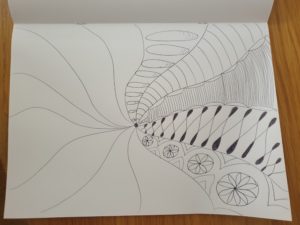
31 March 2020: Home learning
Good morning!
Thank you to those of you who emailed me your posters – it was great to hear from you and see what you’ve been up to.
Answers to yesterday’s learning:
Factors of 18: 1,18,2,9,3,6
Factors of 14: 1,14,2,7
Factors of 16: 1,16,2,8,4
Factors of 30: 1,30,2,15,3,10,5,6
Factors of 25: 1,25,5
Factors of 42: 1,42,2,21,3,14,6,7
Factors of 48: 1,48,2,3,4,6,8,12,16,24,48
Factors of 60: 1,60,2,30,3,4,5,6,10,12,15,20
6 is a factor of 24= true
12 and 7 are factors of 72= false
3 is a factor of 27= true
1,3 and 8 are factors of 48= true
8 is a factor of 54= false
2,6 and 8 are factors of 42= false
Today’s learning is multiples.
A multiple is the product result of one number multiplied by another number.
Multiples of 3: 3,6,9,12, 15, 18 etc.
Warm up: Ninja multiples
Task:
Investigate
Are all multiples of 8 multiples of 4?
Are all multiples of 4 multiples of 8?
Common multiples:
A common multiple is a number that is a multiple of two or more numbers. The common multiples of 3 and 4 are 12, 24, 36
- Write the common multiples of 4 and 6
- Write the common multiples of 2 and 3
Challenge:
Annie is double her sister’s age.
They are both older than 20 but younger than 50.
Their ages are both multiples of 7.
What are their ages?
Reading task
Read the article from this week’s First News and answer the RIC questions.
History task:
Look at the images of the Viking artefacts. Answer the questions for each artefact.